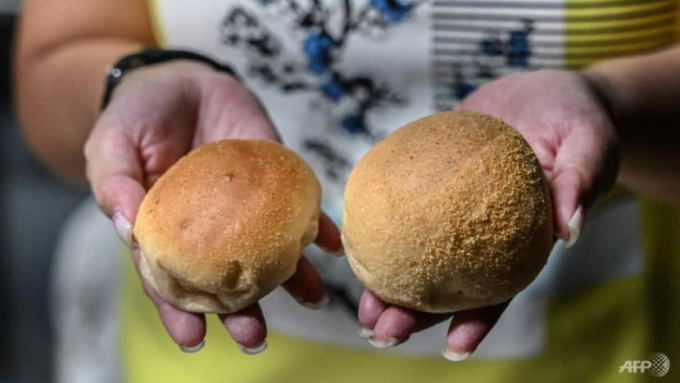November 27, 2025 | 20:30 GMT +7
November 27, 2025 | 20:30 GMT +7
Hotline: 0913.378.918
November 27, 2025 | 20:30 GMT +7
Hotline: 0913.378.918

Many Philippine bakers are shrinking the size of a popular breakfast roll to cope with higher inflation.
The slightly sweet and pillowy soft "pandesal", which Filipinos often dunk in coffee or stuff with cheese, used to weigh 35g at Matimyas Bakery, a breadmaker in suburban Manila.
But as the cost of local and imported ingredients soared in recent months, co-owner Jam Mauleon gradually reduced the size of the roll - known as the "poor man's bread" because it is cheap - to around 25g to avoid raising the 2.50 peso (about US$0.04) price.
She feared that even a slight increase would send cash-strapped customers in her neighbourhood to a rival bakery five blocks away.
"We had to reduce the serving size to survive," Mauleon told AFP, as children, workers and retirees arrived early to buy rolls baked in a brick oven that morning.
As the Philippines lifted COVID-19 restrictions and schoolchildren began returning to the classroom this year, Mauleon had hoped economic conditions for the bakery would improve.
But since December, as wheat and fuel prices surged, the price of flour has increased by more than 30 per cent, while sugar is up 25 per cent and salt costs 40 per cent more, she said.
The bakery survives day to day and does not make enough money to buy ingredients in bulk, leaving it vulnerable to changing prices in domestic and international markets.
After reducing the number of employees and absorbing higher costs, Mauleon was forced this week to raise the price of a pandesal by 20 per cent to three pesos.
Shrinking the size of the roll any further would affect its quality, she said.
"We will try it out if people will still buy it," Mauleon said.
"Pandesal is very important in the lives of Filipinos."
For mother-of-five Laarni Guarino, the price hike means her family now eats fewer rolls for breakfast.
"We will have to redo our budget. From five pieces each, my children will have to eat just three to four," Guarino, 35, told AFP.
"Fifty centavos is a big thing for poor people like us."
"SHRINKFLATION"
Lucito Chavez, president of an association representing local bakeries, said thousands of breadmakers were reeling from the higher cost for raw materials, most of which are imported.
"All of us are struggling, not to make profit, but to survive," Chavez told AFP.
"We have to protect the pandesal industry."
Inflation in the Philippines hit 6.1 per cent in June, the highest level in nearly four years, as steep fuel price hikes pushed up food and transport costs.
Lawmaker and economist Joey Salceda said bread would be hardest hit by "shrinkflation", where the size of a product gets smaller but the price stays the same.
"Wheat prices have increased by 165 per cent," he told reporters recently, urging bakeries to fortify their products with vitamins and minerals.
(CNA; AFP)

(VAN) A new study reveals how the simultaneous effects of ocean acidification, salinity and loss of oxygen are making the world more fragile.

(VAN) Hopes are growing that the creation of the first 3D turkey gut model could be a turning point in the battle against the virulent blackhead disease.

(VAN) Tyson, America’s biggest meat supplier, plans to shutter one of its largest beef processing plants as the industry continues to struggle with low cattle supplies and political pressure from Washington.

(VAN) New FAO study shows how digital solutions are empowering farmers and fishers to prevent losses and build resilient agrifood systems.

(VAN) Brazil's COP30 presidency pushed through a compromise climate deal on Saturday that would boost finance for poor nations coping with global warming but that omitted any mention of the fossil fuels driving it.

(VAN) Poultry farmers in the UK have been warned that they could face one of the worst winters yet for bird flu.

(VAN) Prices of main-crop paddy have risen sharply, with jasmine rice hitting 16,100 baht per tonne — the highest level in years.